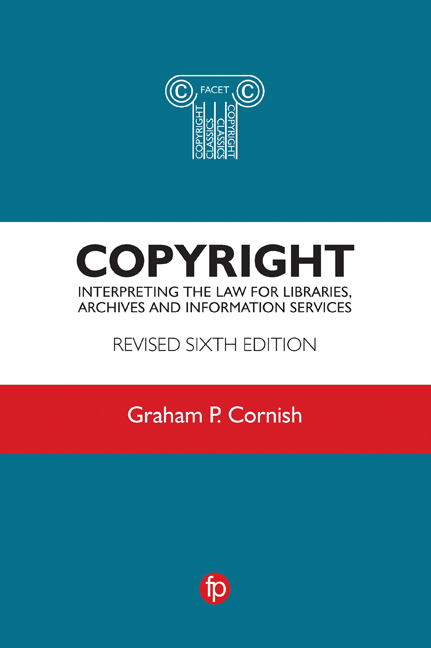Book contents
- Frontmatter
- Contents
- Author's note
- Acknowledgements
- List of abbreviations
- Introduction
- Section 1 Definition and law
- Section 2 What is covered by copyright?
- Section 3 Rights and limitations
- Section 4 Literary, dramatic and musical works
- Section 5 Artistic works
- Section 6 Sound recordings and performers’ rights
- Section 7 Films and videos
- Section 8 Broadcasts
- Section 9 Databases
- Section 10 Licensing schemes and licences
- Section 11 Computer programs, the electronic world and websites
- Section 12 Other matters
- Useful Addresses and Contacts
- Useful Sources of Information
- Appendix: suggested declaration forms
- Index
Section 12 - Other matters
Published online by Cambridge University Press: 19 November 2019
- Frontmatter
- Contents
- Author's note
- Acknowledgements
- List of abbreviations
- Introduction
- Section 1 Definition and law
- Section 2 What is covered by copyright?
- Section 3 Rights and limitations
- Section 4 Literary, dramatic and musical works
- Section 5 Artistic works
- Section 6 Sound recordings and performers’ rights
- Section 7 Films and videos
- Section 8 Broadcasts
- Section 9 Databases
- Section 10 Licensing schemes and licences
- Section 11 Computer programs, the electronic world and websites
- Section 12 Other matters
- Useful Addresses and Contacts
- Useful Sources of Information
- Appendix: suggested declaration forms
- Index
Summary
International treaties
What importance does international copyright have?
Technically there is no such thing as ‘international copyright’. Each country has its own copyright laws but nearly all countries belong to some or all of the three international conventions. Under these treaties and conventions each country protects the works produced in other countries as if they had been produced within its own borders, although usually works are not protected in a country for longer than they would be in the country of origin. So if a work is produced in a country where protection lasts for 50 years but is imported into a country where protection lasts for 70 years, then the work would still be protected for only 50 years in that country.
Which are these three major conventions?
The Berne Copyright Convention, the Universal Copyright Convention (UCC) and the Trade Related Intellectual Property element of the World Trade Agreement. A fourth, the World Intellectual Property Organization (WIPO) Copyright Treaty, was agreed in 1996. There are also international treaties covering sound recordings (phonographs), film and video and copying material for visually impaired people and others with print disabilities.
Are there any countries which do not belong to any of these conventions?
Yes, but the number is decreasing all the time. Those where representatives have not signed one or more treaties cannot benefit from the liberalisation of trade planned under the World Trade Agreement, so there is an incentive to reform or improve national copyright laws in most countries.
If a country does not belong to one of these treaties does this mean that its publications can be copied?
Perhaps. Although not all countries belong to one of the international treaties, one or two have signed bilateral agreements with the UK for mutual protection. It is best to check the latest SI (see Section 1).
What is the importance of the copyright symbol (ã)?
The idea of the ã symbol is to indicate the work was protected by copyright in the country of origin and has been registered for copyright protection. This is important under the UCC as publications without the symbol are not regarded as protected.
- Type
- Chapter
- Information
- CopyrightInterpreting the law for libraries, archives and information services, pp. 175 - 178Publisher: FacetPrint publication year: 2019



